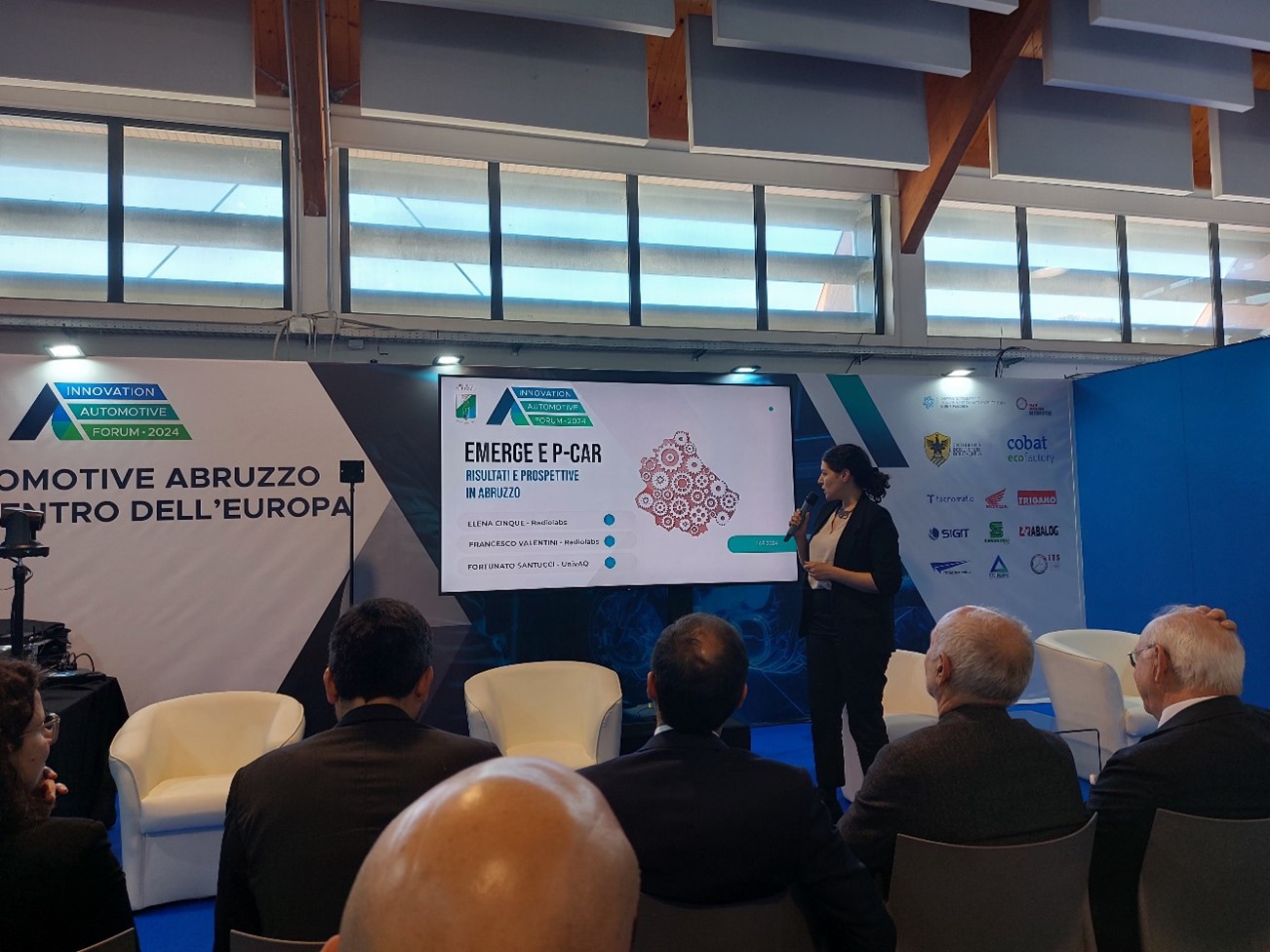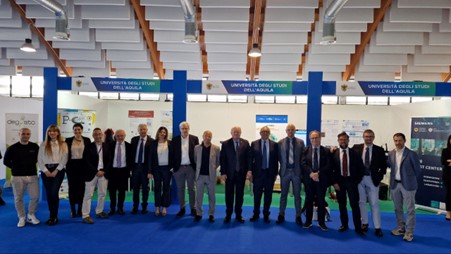Tecnologie made in Italy dall’ecosistema per l’innovazione dell’Abruzzo

L’automotive è il cuore pulsante della Regione Abruzzo con 8 miliardi di fatturato, 23.000 addetti e una significativa crescita in termini di export intorno al 48%. Nella Val di Sangro sono presenti Stellantis Europe Spa Atessa, che produce dal 1981 il Ducato, veicolo commerciale leggero più venduto in Europa e Honda Italia Industriale Spa, unico sito manifatturiero Honda in Europa per le due ruote. In questa area, sono concentrate molte delle aziende dell’indotto e ha sede il Polo Innovazione Automotive, rete di aziende Piccole e Medie imprese, Università e Centri di ricerca. Nell’Abruzzo sono presenti anche importanti insediamenti industriali come Leonardo, Telespazio, Thales Alenia Space ed Elital che operano in un contesto internazionale in forte crescita.
All’Innovation Automotive Forum – IAF organizzato dal Polo Innovazione Automotive in collaborazione con la Regione Abruzzo e la Camera di commercio Chieti Pescara e con la partecipazione di Adolfo Urso, ministro dell’Impresa e Made in Italy, Marco Marsilio presidente della Regione Abruzzo e Edoardo Alesse Rettore dell’Università dell’Aquila sono state presentare le eccellenze e il sistema di competenze e produzione regionali.
In questo contesto ha avuto luogo il Workshop sulle Tecnologie Satellitari per l’Automazione Ecosostenibile e Sicura dei Veicoli che ha riunito rappresentanti dei gestori infrastrutture stradali, operatori dei servizi di mobilità, Agenzia Spaziale Italiana ed Europea, industrie, Università e Centri di Ricerca. Il Workshop ha rappresentato per Radiolabs l’occasione per presentare i risultati dell’eco-sistema per l’innovazione creato nella Regione Abruzzo per promuovere l’innovazione e le collaborazioni fra i domini satellitari e automotive presenti sul territorio. Questa iniziativa, unica in Italia, è coerente con la Smart Specialisation Strategy S3 (2021-27) della Regione Abruzzo che include l’Aerospazio e l’Automotive negli ambiti di specializzazione caratteristici del proprio territorio. Il programma S3 promuove l’innovazione basata sul territorio per consentire uno sviluppo economico sostenibile e resiliente, per individuare priorità ed azioni in grado di massimizzare gli effetti degli investimenti in ricerca e innovazione, la collaborazione interregionale e per collegare le valli regionali dell’innovazione nelle aree tematiche chiave individuate nella nuova agenda europea.

L’eco-sistema abruzzese – nato nel 2018 con la firma dell’Accordo per l’Innovazione con l’allora MISE (oggi MIMIT) ha dato vita ad un partenariato Ricerca-Industrie fra Radiolabs, Leonardo, Telespazio, Elital e Università dell’Aquila presenti nella Regione consentendo di avviare un piano pluriennale per sviluppare le tecnologie abilitanti per la guida connessa ed autonoma dei veicoli. A fare da apripista il progetto EMERGE coordinato da Radiolabs in collaborazione con FCA (l’attuale STELLANTIS). Il progetto, presentato da Elena Cinque di Radiolabs, è incentrato sulla guida cooperativa del veicolo Ducato per trasporto logistico e gestione emergenze ed ha permesso lo sviluppo delle tecnologie di geo-localizzazione, di sistemi di telecomunicazioni basati su reti terrestri e satellitari, tecniche di cybersecurity e nuove applicazioni come l’orizzonte artificiale e la gestione dinamica del traffico con tecniche di Intelligenza Artificiale. Sono stati allestiti tre veicoli come laboratori mobili ed è stato realizzato in Abruzzo un nodo MEC – Mobile Edge Computing basato su rete 5G in collaborazione con il progetto SCALA di Stellantis, propedeutico ai futuri sviluppi fra i quali l’integrazione delle reti 5G con le costellazioni satellitari a bassa orbita in maniera da realizzare una copertura capillare su tutto il territorio a basso impatto ambientale.
 L’obiettivo principale dell’eco-sistema abruzzese sono le nuove tecnologie per l’auto a guida connessa ed autonoma per le quali le tecnologie satellitari stanno assumendo una importanza crescente ed EMERGE come ha sottolineato Alessandro Neri presidente di Radiolabs, ha svolto un ruolo di volano per acquisire una serie di progetti di Ricerca complementari fra loro, del valore di circa 15 M€ . Questi progetti, in gran parte finanziati a livello internazionale, sono stati realizzati grazie ad un partenariato pubblico-privato ed il contributo dell’Agenzia Spaziale Italiana creando importanti ricadute sul territorio. Come il Centro di Eccellenza Ex-EMERGE, presentato da Fortunato Santucci dell’Università dell’Aquila Direttore del Centro ed il Laboratorio Radiolabs, entrambi ubicati nel Tecnopolo Abruzzese dove una squadra inter-disciplinare di circa 30 fra professori, ricercatori e ingegneri sviluppano, progettano e sperimentano i sistemi di geo-localizzazione ad elevatissima precisione e sicurezza, di telecomunicazioni fra veicoli e centri di controllo nonché le tecniche di cybersecurity incentrate al futuro veicolo che deve essere sempre connesso, geo-localizzato e resiliente ad attacchi cyber. Particolare attenzione viene dedicata dal Centro di Eccellenza Ex-EMERGE per la Formazione specialistica che ad oggi ha permesso a 15 studenti di conseguire il Dottorato di Ricerca (PhD) nelle nuove discipline per le quali servono competenze distintive.
L’obiettivo principale dell’eco-sistema abruzzese sono le nuove tecnologie per l’auto a guida connessa ed autonoma per le quali le tecnologie satellitari stanno assumendo una importanza crescente ed EMERGE come ha sottolineato Alessandro Neri presidente di Radiolabs, ha svolto un ruolo di volano per acquisire una serie di progetti di Ricerca complementari fra loro, del valore di circa 15 M€ . Questi progetti, in gran parte finanziati a livello internazionale, sono stati realizzati grazie ad un partenariato pubblico-privato ed il contributo dell’Agenzia Spaziale Italiana creando importanti ricadute sul territorio. Come il Centro di Eccellenza Ex-EMERGE, presentato da Fortunato Santucci dell’Università dell’Aquila Direttore del Centro ed il Laboratorio Radiolabs, entrambi ubicati nel Tecnopolo Abruzzese dove una squadra inter-disciplinare di circa 30 fra professori, ricercatori e ingegneri sviluppano, progettano e sperimentano i sistemi di geo-localizzazione ad elevatissima precisione e sicurezza, di telecomunicazioni fra veicoli e centri di controllo nonché le tecniche di cybersecurity incentrate al futuro veicolo che deve essere sempre connesso, geo-localizzato e resiliente ad attacchi cyber. Particolare attenzione viene dedicata dal Centro di Eccellenza Ex-EMERGE per la Formazione specialistica che ad oggi ha permesso a 15 studenti di conseguire il Dottorato di Ricerca (PhD) nelle nuove discipline per le quali servono competenze distintive.
La transizione verso la guida connessa ed autonoma impone anche strumenti adeguati alla validazione e certificazione dei sistemi tecnologici per dimostrare il raggiungimento dei livelli di sicurezza in assenza parziale o totale del guidatore e in qualunque scenario operativo. Una sfida questa che richiede competenze molto elevate e può produrre importanti ricadute in quanto circa il 30% dei costi degli apparati è dedicato alla validazione e certificazione. Per cogliere questa opportunità è nato il progetto P-CAR assegnato a Radiolabs dall’Agenzia Spaziale Europea e finanziato dall’Agenzia Spaziale Italiana nell’ambito del programma NAVISP-3. Con P-CAR ha dichiarato Francesco Valentini di Radiolabs stiamo realizzando in collaborazione con l’Università dell’Aquila ed Intecs, il primo Centro Europeo Accreditato per la validazione e certificazione delle nuove tecnologie per l’auto connessa ed autonoma.
Il Centro sarà in grado di riprodurre nei laboratori tutti gli ambienti in cui l’auto deve operare e al contempo simulare scenari estremi (es. pioggia, neve, nebbia, strada dissestata ecc.) in cui l’auto potrebbe trovarsi a viaggiare. L’obiettivo è consentire ai fornitori di apparati e auto di validare le prestazioni dei propri prodotti minimizzando il ricorso ai test in campo che, oltre a richiedere costi e tempi elevati, non sono esaustivi al fine della sicurezza. Il Centro ubicato all’Aquila è stato concepito con una architettura basata su cloud per connettere altri Laboratori e Centri di Eccellenza di tutto il mondo dando vita ad un Laboratorio interconnesso e virtualizzato per offrire i servizi agli utenti senza limiti geografici.
Il Workshop sulle Tecnologie Satellitari è stato aperto da Domenico Crocco di ANAS, Presidente del Comitato Tecnico Guida Autonoma e nuove tecnologie per la sicurezza di PIARC Italia che ha sottolineato il ruolo centrale delle nuove tecnologie per migliorare la sicurezza sulle strade dove ogni anno 1,3 milioni di persone perdono la vita nel mondo ed è stato concordato un piano per dimezzare il numero di morti entro il 2030 ed eliminarle completamente entro il 2050. La Smart Road ha aggiunto Crocco, grazie all’intelligenza artificiale, permette già il dialogo fra le infrastrutture stradali ed i conducenti e di fornire loro tutte le informazioni sul traffico e sulla sicurezza.
Particolarmente rilevanti gli interventi dell’ASI al fine di delineare una strategia nazionale che promuova le tecnologie satellitari per il settore automotive. Giancarlo Varacalli – responsabile Unità Navigazione e Telecomunicazioni di ASI – ha presentato i progetti nel settore dei trasporti fra i quali una prima Rete di Augmentation per applicazioni automotive e rail e lo sviluppo dei sistemi di localizzazione avanzati per la guida connessa ed autonoma di Livello 3 e superiore. Sul fronte internazionale, Varacalli ha illustrato il ruolo del programma NAVISP-3 dell’ESA che fra gli altri contribuisce alla realizzazione del Centro P-CAR in Abruzzo. Ha anche auspicato che sul fronte delle telecomunicazioni l’Europa e l’Italia perseguano un piano coinvolgendo i principali players del settore per l’integrazione delle tecnologie di telecomunicazioni satellitari e terrestri a supporto dell’evoluzione dell’auto a guida connessa.
Mauro Cardone – Responsabile dei programmi di Navigazione in ASI – ha sottolineato il ruolo centrale del GNSS come fonte attuale di localizzazione assoluta del veicolo assieme alle mappe ad alta definizione. Ma per far fronte alle nuove sfide, come l’incremento della precisione e dei livelli di integrità per la guida connessa e autonoma saranno determinanti le nuove tecnologie di “fusione” dei dati GNSS con quelli di altri sensori, gli Algoritmi RAIM e l’utilizzo di tecniche NRTK, PPP, RTK in corso di sviluppo. Cardone ha inoltre posto l’accento sull’intelligenza artificiale per la localizzazione e mappatura degli oggetti lungo la strada e il rilevamento accurato e continuo della segnaletica indispensabili per la pianificazione in sicurezza del percorso emulando il comportamento umano.
Sul fronte dei chip per il GNSS, è intervenuta Ilaria Martini – Integrity Domain Leader Principal Research Engineer di U-Blox, azienda leader mondiale con 100 Milioni di chip e sistemi venduti nel 2023. Martini ha sottolineato l’importanza del mercato automotive sul quale sono concentrati con la nuova generazione di chip progettati per soddisfare il posizionamento sicuro e accurato del veicolo autonomo traguardando i requisiti dei Livelli 3-5. Su questo tema è intervenuto Roberto Capua – Responsabile Innovazione di Sogei – nella veste di Chairman del Comitato RTCM SC-134, organizzazione internazionale non profit che sta definendo gli standard dei nuovi sistemi GNSS ad elevata accuratezza ed integrità con un approccio multimodale: automotive, ferroviario e marino. I nuovi standard ha concluso Capua saranno proposti per l’approvazione all’Assemblea Plenaria agli inizi del 2025.
Lato industriale sono intervenuti Valerio di Claudio di Leonardo che ha presentato le on-board unit sviluppate nel progetto EMERGE e Olivier TAHIR della start-up Safe Industries che ha realizzato una piattaforma multi-sensore per il trasporto pubblico locale. Matteo Lucchetti -Direttore Operativo Cyber 4.0 – ha presentato le iniziative ed i progetti in ambito Automtive e Cyber Security.
Ha concluso il Workshop Carola Di Paolo – Responsabile Direzione Commerciale, Monitoraggio Flotta e Progetti Speciali della Società Unica Abruzzese di Trasporto (TUA) – che gestisce il 65 % circa dei servizi su gomma e ferroviari in Abruzzo e sta lavorando all’implementazione di una soluzione integrata di mobilità multimodale nell’ambito del programma MaaS Mobility as a Service for Italy”, diventando parte della Missione presentando l’esperienza di Digitalizzazione in TUA.


